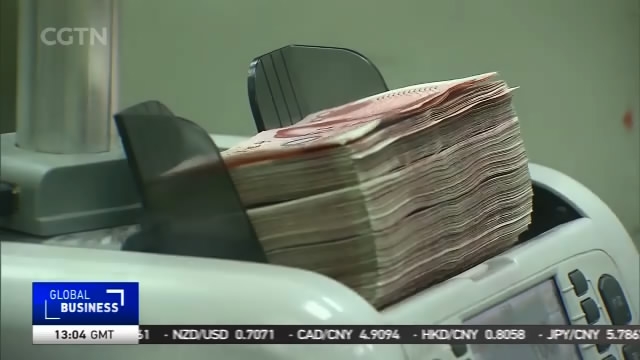
21:32, 25-Apr-2018
Reserve Requirement Ratio Cut: Extra cash released to support domestic SMEs
02:41

From today, the reserve requirement ratio for commercial banks in China will be cut by one percentage point. That will reduce the amount of money they must hold against possible bad loans. As a result, a large amount of liquidity will be released into the money market. The aim is for the extra cash to go towards helping small and medium-sized companies. Chen Tong has the story.
According to the People's Bank of China, commercial banks will use a large proportion of the funds -- about 900 billion yuan which was unleashed by the reduction in the reserve requirement ratio -- to pay back their medium-term lending facility loans from the central bank. Once the MLF loans are repaid, commercial banks will be relieved of the burden of paying interest on them to the central bank. And that in turn should let them lower financing costs for business loans, especially to small and medium-sized companies.
DENG ZHIJIAN, INVESTMENT STRATEGIST DBS CHINA "Actually we know that, in these past two or three years, SMEs or other big corporations, they all face the same problem, like it's very difficult to source financing. Financing is very expensive. This liquidity release will help them a little bit."
For commercial banks, it's not always easy to decide whether to lend money to small firms that have weaker financial backgrounds, and yet it is just these firms which have larger demands for loans. The reduction in the reserve requirement ratio will result in the banks having a net gain of 400 billion yuan on hand, mostly with city commercial banks and the larger rural commercial banks. Experts believe this money should help boost the economy in the second quarter of the year, but the help won't be substantial.
CHEN JI, SENIOR ANALYST BANK OF COMMUNICATIONS "It will give some limited support. The central bank has made it clear that unleashed liquidity is to help companies such as SMEs in the manufacturing sector, and some exporters which might be affected by the China-US trade disputes. But overall, a few billion in funds will give only some limited support to the economy, not the substantial benefits people are imagining."
The PBOC has been careful to point out that the reduction in the reserve requirement ratio does not mean a change in overall monetary policies. The central bank says it will continue to maintain policy at a prudent and neutral level, and will maintain relatively high reserve requirement ratios to ensure the banks are able to fend off financial risks.

SITEMAP
Copyright © 2018 CGTN. Beijing ICP prepared NO.16065310-3
Copyright © 2018 CGTN. Beijing ICP prepared NO.16065310-3